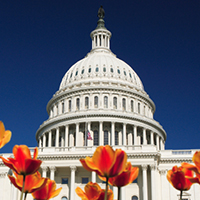Because federal and state government policies can greatly impact our member companies’ ability to develop and bring to market products and therapies, we diligently monitor a number of policy debates — both in Washington, DC and Trenton — that could have bottom-line impacts on life sciences companies.
The following are some federal and state policy topics with which we are engaged.

The HealthCare Institute of New Jersey and its member companies share the goal of lowering health care costs and expanding patient access for the tens of millions of Americans who rely on our life-saving and life-altering medicines, medical devices and technologies, vaccines and diagnostic tools.
We have, and will, continue to engage New Jersey’s policymakers and key opinion leaders on comprehensive, realistic ways to lower costs for patients while ensuring that new medical breakthroughs can continue to be discovered.
Several pragmatic proposals to achieve this goal are worthy of close consideration:
HINJ looks forward to working with all stakeholders to find a balanced way to lower health care costs that sustains medical innovation and reflects the thoughtful approach, learned insights, policy acumen and responsible governance necessary to navigate the extraordinary complexities of our health care system.
In the aftermath of COVID-19, it’s difficult to envision another looming global health crisis that requires our urgent attention – but antimicrobial/antifungal resistance (AMR) is one of the biggest public health challenges of our time. Without sustained, immediate action, we risk facing a world in which a simple cut or a benign visit to a hospital can be a life-threatening situation.
Companies are working diligently with the Centers for Disease Control (CDC) and the federal government to solve this impending crisis. HINJ supports the PASTEUR (Pioneering Antimicrobial Subscriptions To End Upsurging Resistance) Act that would enhance our industry’s efforts.
New Jersey has one of the highest concentrations of medical device and medical technology companies in the world. They have been at the forefront of the COVID-19 pandemic, leading the effort on innovative diagnostic tests that have helped flatten the curve and enabled our national and global economy to continue functioning. Just as important is the immense challenge of manufacturing the vaccine delivery devices once a vaccine is approved – another area in which the medical device community plays a critical role.
Diagnostic testing and the billions of devices delivering a vaccine to patients around the world will both be key in solving this crisis. Coordination with our federal government and New Jersey policymakers on these monumental tasks is at the forefront of HINJ’s policy goals.
HINJ supports H.R.1691, the Ensuring Patient Access to Critical Breakthrough Products Act of 2023, also known as the “Breakthrough” bill. This legislation would provide four years of automatic coverage for designated breakthrough devices approved or cleared by the FDA. It would also create a roadmap for additional evidence collection for CMS to make a permanent coverage decision after that period. This would ensure seniors have quicker access to these life-changing technologies, while providing the necessary autonomy for CMS to evaluate the technology. The bill would also provide a pathway for breakthrough digital technologies that are otherwise not covered by Medicare.
HINJ also supports H.R. 2369, The VALID Act (Verifying Accurate, Leading-edge IVCT Development). This legislation would modernize the way FDA regulates diagnostic tests and strikes the right balance between advancing innovation and ensuring proper oversight of all diagnostic tests. It would ensure that regulation is commensurate to the risk of an inaccurate test, support innovation with a new technology certification pathway, and ensure tests are accurate and reliable for patients and providers.

HINJ works to ensure that all patients have access to the medicines, technologies and therapies that their doctors deem most appropriate.
HINJ supports requiring insurance companies and PBMs to share drug manufacturers’ rebates with patients.
HINJ also promotes wellness initiatives and medication adherence as strategies to improve health outcomes and reduce costs in the health care system.
HINJ works with policymakers and related stakeholders to make New Jersey a competitive venue for industry investment and job creation.
Economic development issues include having a competitive tax structure, a user-friendly regulatory system and predictable permitting process, a world-class, STEM-trained workforce, a supportive and comprehensive state-based vendor and supplier network, and a collaborative higher education community.
Innovation is the lifeblood of the life sciences community. Changing business models require that the business and research and development (R&D) environments adapt to support the life sciences.
With a trend of ever-increasing collaboration between industry and higher education occurring, combined with government’s role in shaping the business environment, HINJ is working to bring together these stakeholders — private sector, academia and government — to build and maintain a world-class “Innovation Ecosystem” that can support innovation-driven industries in New Jersey.
HINJ co-founded InnovationNJ, a coalition of industry, higher education and government, to bring like-minded organizations together to promote and reaffirm New Jersey’s position as a historic, global leader in innovation.